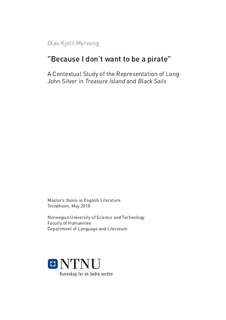| dc.description.abstract | This thesis is a study of contextuality, proximation, and discourse in the novel Treasure Island (1883) by Robert Louis Stevenson and the television series Black Sails (2014-2017) by Robert Levine and John Steinberg, which is made as a prequel to Stevenson's novel. First, the aim is to establish viable terminology in order to define and explain what methods the filmmakers have used. Second, the canonical pirate Long John Silver is discussed as an example of how a character is kept alive through the creation of adaptations and appropriations. The third part of the thesis seeks to explore which elements the filmmakers have kept unchanged, which elements have undergone proximation, and what has been added to the modern prequel series. In the thesis, these choices are suggested to be based upon the social context of the time in which the appropriation is created. The thesis is based upon a close reading of the novel and the viewing of the STARZ-series in its entirety. Treasure Island, as one of several adventure novels of the Victorian era, was written for an audience of young boys, and in an attempt to stimulate the patriotic spirit of exploration in the name of Empire. Black Sails is a prequel to the events of the plot in Stevenson's novel, aimed at an older audience containing more brutal and sexual content, focusing on the perspective of the pirates, both actual and fictional. The analysis focuses on how Mr. Silver is portrayed in both works, underlining changes based on context and the links between the nineteenth-century novel and its twenty-first century appropriation. The study finds signs that the change of social context in particular has had a major impact on the presentation of John Silver and his fellow pirates. In the process it has also granted space for female, homosexual and anti-imperialistic voices, fulfilling the implicit demands of a new audience. | nb_NO |
